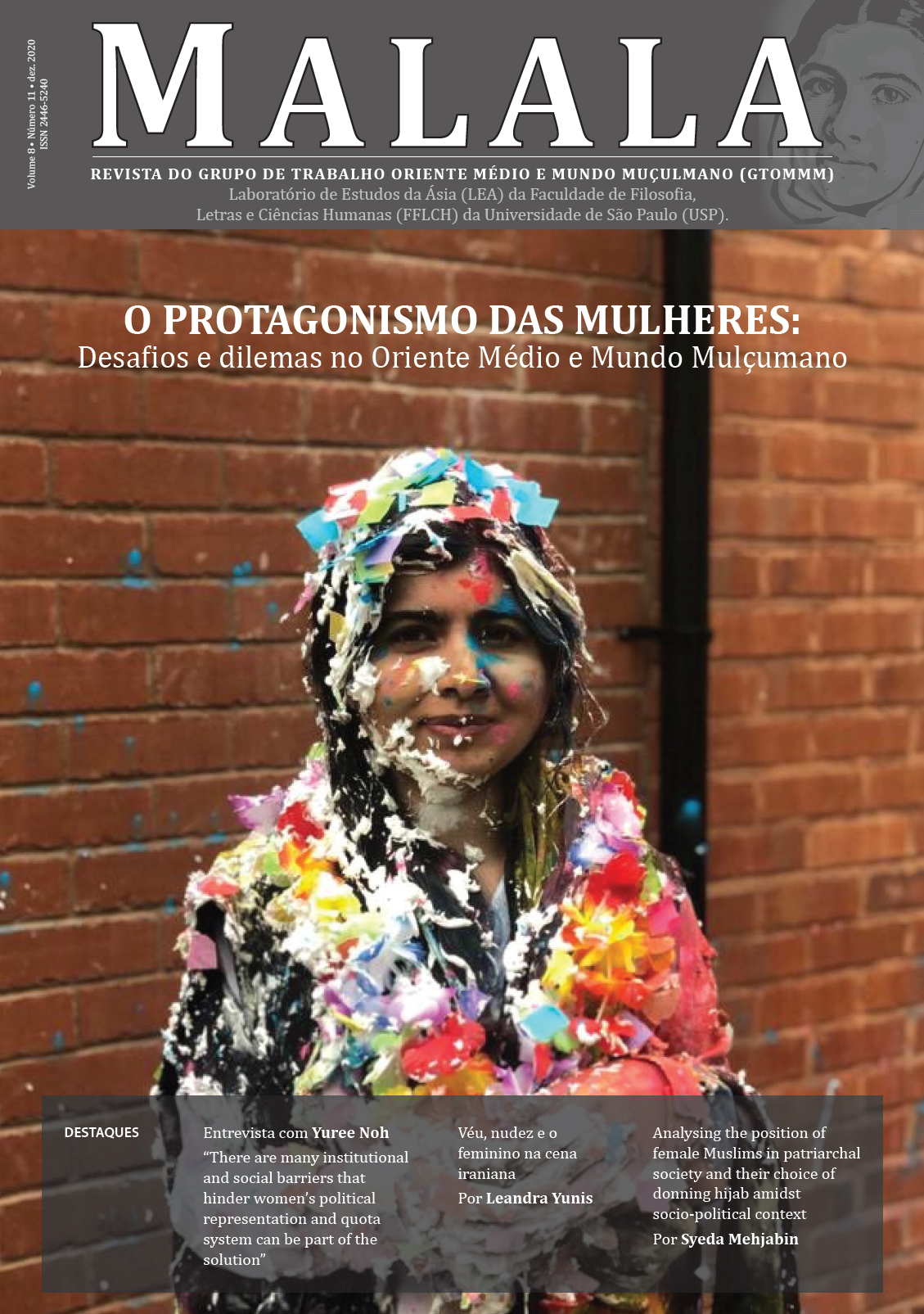Entre memória e ativismo político: contribuições de Nawal El Saadawi para o feminismo egípcio e transnacional
DOI:
https://doi.org/10.11606/issn.2446-5240.malala.2020.161802Palavras-chave:
mulheres muçulmanas, memória, ativismo políticoResumo
Resenha comentada de “A Face oculta de Eva: as mulheres do mundo árabe” e “A Mulher com olhos de fogo – o
despertar feminista” (publicações brasileiras, de 2002 e de 2019, respectivamente).
A partir de reflexões acerca da obra da ativista feminista egípcia Nawal El Saadawi e do desenvolvimento de discussões entre memória, trajetória e a busca das mulheres muçulmanas por direitos em Estados do Oriente Médio e Norte da África o texto visa apresentar as possibilidades e os desafios de problematizar a agência feminina com foco em questões como a normatização dos corpos femininos pelo viés da tradição, a discussão das leis de família, o acesso à educação, assim na intersecção entre gênero, cultura e religião que é uma característica da obra de Nawal El Saadawi.
Downloads
Referências
ABU-LUGHOD, Lila. “As mulheres muçulmanas precisam realmente de salvação?: reflexões
antropológicas sobre o relativismo cultural e seus outros”. Revista Estudos Feministas, v.
, n. 2, p. 451-470, maio, 2012.
AHMED, Leila. Women and gender in Islam: roots of a modern debate. New York & London:
Yale University Press, 1992.
ASAD, Talal. “The idea of an anthropology of Islam”. Poznan Studies in the Philosophy of
the Sciences and the Humanities, v. 48, p. 381-406, january, 1996.
ASAD, Talal. “Thinking about tradition, religion, and politics in Egypt today”. Critical Inquiry,
volume 42, issue 1, p. 166-214, autumn 2015.
BADRAN, Margot. Feminism in Islam. Secular and Religious Convergences. Oxford: Oneworld
Oxford, 2009.
BADRAN, Margot. “From Islamic feminism to a Muslim holistic feminism”. IDS Bulletin, v.
, n. 1, p. 78-87, january, 2011.
EL SAADAWI, Nawal. A face oculta de Eva: as mulheres do Mundo Árabe. São Paulo: Global
Editora, 2002.
EL SAADAWI, Nawal. A mulher com olhos de fogo: o despertar feminista. São Paulo: Faro
Editorial, 2019.
NORA, Pierre. Entre memória e história: a problemática dos lugares. Projeto História: Revista
do Programa de Estudos Pós-Graduados de História, vol.10, p. 7-28, julho-dezembro, 1993.
POLLAK, Michael. Memória, esquecimento, silêncio. Revista Estudos Históricos, vol. 2, nº3
(janeiro-junho), p. 3-15, 1989.
RAMDANI, Nabila. Women in the 1919 Egyptian Revolution: from feminist awakening to
nationalist political activism. Journal of International Women’s Studies, v. 14, n. 2, p. 39-52,
march, 2013.
SHAIKH, Sa’diyya. Transforming Feminism: Islam, women and gender justice. In: SAFI,
Omid(ed). Progressive Muslims: on justice, gender and pluralism. London: Oneworld Oxford,
,p.147-162.
UNITED NATIONS CHILDREN’S FUND (UNICEF). Female Genital Mutilation/Cutting: A
statistical overview and exploration of the dynamics of change. New York: UNICEF, 2013.
Disponível em: <https://www.unicef.org/publications/index 69875.html>. Acesso em: 21
maio 2020.
WORLD HEALTH ORGANIZATION et al.. Eliminating Female Genital Mutilation: An interagency
statement, UNAIDS,
UNDP,UNECA,UNESCO,UNFPA,UNHCHR,UNHCR,UNICEF,UNIFEM,WHO. Geneva: WHO,
Disponível em: < https://www.who.int/reproductivehealth/publications/
fgm/9789241596442/en/>. Acesso em: 21/05/2020.
Downloads
Publicado
Edição
Seção
Licença
Copyright (c) 2020 Flávia Abud Luz

Este trabalho está licenciado sob uma licença Creative Commons Attribution-NonCommercial-ShareAlike 4.0 International License.
Esta revista oferece acesso livre ao seu conteúdo, seguindo o princípio de que disponibilizar gratuitamente o conhecimento científico ao público proporciona maior democratização mundial do conhecimento. Não será cobrado nenhum tipo de taxa ao longo do processo de submissão de trabalhos e publicação da revista, bem como para leitura, download, cópia, distribuição, impressão, pesquisa ou referência após sua publicação. Leitores e partes interessadas são livres para compartilhar (copiar ou distribuir o material em qualquer mídia e formato) e para transformar ou adaptar partes do material desde que para uso não comercial e desde que o crédito apropriado seja dado ao autor e à Revista, indicando de que forma os dados foram utilizados e/ou manipulados.





